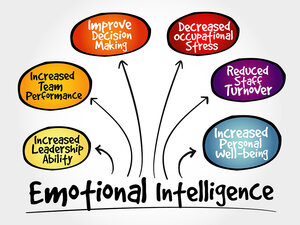Course Overview
Learn how to improve your emotional intelligence and control your responses by taking the Emotional Intelligence (EQ) In The Workplace Training. In addition, how you come across at work depends a lot on your emotional intelligence. Additionally, it is based on your unbiased evaluation of various individuals and circumstances.
You will comprehend what EQ is after finishing this one-day training. You will also learn the four fundamental abilities needed to perform self-management: self-awareness, self-regulation, and self-motivation. Learn how to apply empathy, comprehend, control, and express your emotions effectively in this emotional intelligence training course. After taking this course, the advantages of having a high EQ will also become clear.
For success in the workplace, emotional intelligence is crucial. Effective relationships can be created by leaders and staff who are emotionally savvy to raise productivity at work. Your success and leadership potential depend on your ability to comprehend and develop your emotional intelligence.
The focus of this training session on emotional intelligence for workplace success will be on the crucial abilities needed to create good relationships, lead teams successfully, and handle the variety of personalities that are typically present at work. Building a successful company requires the ability to recognize our own and others’ emotions, engage in creative teamwork, and promote team member synergy.



Course Objectives
- What does emotional intelligence mean? (EQ)
- The advantages of emotional intelligence
- Learn the four fundamental abilities needed to use emotional intelligence.
- Define self-management, self-awareness, self-regulation, self-motivation, and empathy, then put them into practice.
- Read the related verbal and nonverbal cues.
- successfully interact with others through nonverbal communication
- converse with others orally
- Interpret and control your feelings.
- mastering the skills necessary to manage and control one’s own emotions
- Express your feelings in the appropriate language.
- Combine positive and negative thinking
- positively affect others
- Describe how to apply emotional intelligence at work.
- Employ the ideas and methods in the workplace.
- hone interpersonal abilities including self-awareness, which is the capacity to identify and comprehend one’s own moods, feelings, and desires as well as how they affect others.
- Develop empathy, the capacity to comprehend the emotional makeup of others and the ability to react in accordance with their emotional reactions.
- Develop interpersonal skills that demonstrate your ability to manage connections and create networks.
- Learn how to respond to criticism and adversity.
- Leadership techniques for collaborating with others to achieve common objectives
Management & Supervisory Training Highlights
Training Feedback
Happy Customers
Course Outline
Lesson 1: Is EQ a passing fad?
- The Influence of Feelings
- Useful Emotional Intelligence Models from the Limbic System
Lesson 2: I Feel Therefore I Am Tuning In to My Emotions
- Window Johari
- Self-Control \ Resilience
Lesson 3: Interpersonal abilities Reflection
- The Emotions of Others
- Social Intelligence and Empathy
- Culture and Emotions
Lesson 4: Reflection
- How Emotions at Work Affect Others
- Talking with challenging people
- Adapting to change
- Emotional quotient and toxic workplaces
Lesson 5: The Shadow side
- Manipulation
- emotional candor
Lesson 6: “Leading and Emotions”
- Emotional quotient and leadership
- Mental Flexibility
- EI development in organizations
Lesson 7 Reflections from Reflection
- Make an action plan with accountability and references.
Who Should Attend
- Senior marketing directors or managers
- Relationship managers and
- Customer relationship managers
- Professionals in customer service, supervisors,
- Team leaders, and managers
- Sales experts, salespeople, and sales analysts
- Entrepreneurs and founders of startups
Trainers Available for:
- In-House Trainings
- Online Training
- 2 Hours Crush Program
- Half Day Program
- One Day Program
- Two Days Full Program
Training Techniques
- Power point Presentations
- Engaging conversations
- Case studies
- Exercises in solving problems
- Focus Group Conversations
- Games in Management
- Skits and modeling the part
Request a Quote

